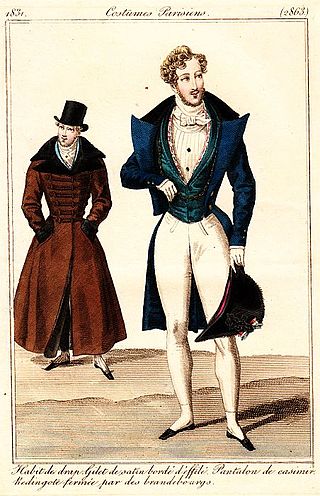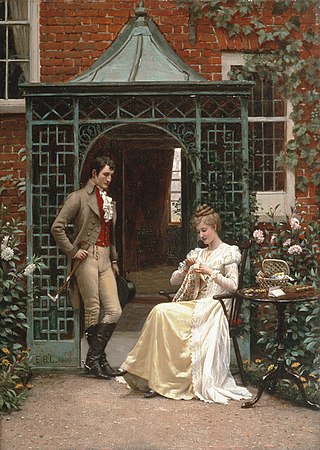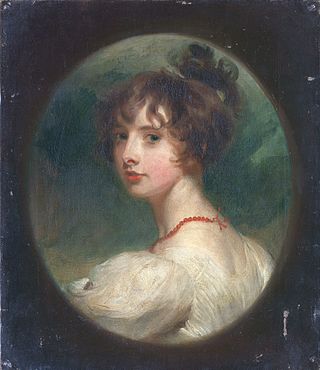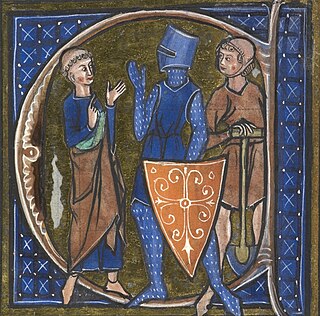
A dandy is a man who places particular importance upon physical appearance and personal grooming, refined language and leisurely hobbies. A dandy could be a self-made man in person and persona, who imitated an aristocratic style of life, despite his middle-class origin, birth, and background, especially in the Britain of the late-18th and early-19th centuries.

Etiquette is the set of norms of personal behaviour in polite society, usually occurring in the form of an ethical code of the expected and accepted social behaviours that accord with the conventions and norms observed and practised by a society, a social class, or a social group. In modern English usage, the French word étiquette dates from the year 1750.

Georgette Heyer was an English novelist and short-story writer, in both the Regency romance and detective fiction genres. Her writing career began in 1921, when she turned a story conceived for her ailing younger brother into the novel The Black Moth. In 1925 Heyer married George Ronald Rougier, a mining engineer. The couple spent several years living in Tanganyika Territory and Macedonia before returning to England in 1929. After her novel These Old Shades became popular despite its release during the General Strike, Heyer determined that publicity was not necessary for good sales. For the rest of her life she refused to grant interviews, telling a friend: "My private life concerns no one but myself and my family."

Catherine Grace Frances Gore, a prolific English novelist and dramatist, was the daughter of a wine merchant from Retford, Nottinghamshire. She became among the best known of the silver fork writers, who depicted gentility and etiquette in the high society of the Regency period.

Snob is a pejorative term for a person who believes there is a correlation between social status and human worth. Snob also refers to a person who feels superiority over those from lower social classes, education levels, or other social areas. The word snobbery came into use for the first time in England during the 1820s.

A socialite is a person usually from a wealthy or aristocratic background who is prominent in high society. A socialite generally spends a significant amount of time attending various fashionable social gatherings, instead of having traditional employment.

Regency romances are a subgenre of romance novels set during the period of the British Regency (1811–1820) or early 19th century. Rather than simply being versions of contemporary romance stories transported to a historical setting, Regency romances are a distinct genre with their own plot and stylistic conventions. These derive not so much from the 19th-century contemporary works of Jane Austen, but rather from Georgette Heyer, who wrote over two dozen novels set in the Regency starting in 1935 until her death in 1974, and from the fiction genre known as the novel of manners. In particular, the more traditional Regencies feature a great deal of intelligent, fast-paced dialogue between the protagonists and very little explicit sex or discussion of sex.

A macaroni was a pejorative term used to describe a fashionable fellow of 18th-century Britain. Stereotypically, men in the macaroni subculture dressed, spoke, and behaved in an unusually epicene and androgynous manner.

Almack's was the name of a number of establishments and social clubs in London between the 18th and 20th centuries. Two of the social clubs would go on to fame as Brooks's and Boodle's. Almack's most famous establishment was based in assembly rooms on King Street, St James's, and was one of a limited number of upper-class mixed-sex public social venues in the British capital in an era when the most important venues for the hectic social season were the grand houses of the aristocracy. The site of the club, Almack's Assembly Rooms or Willis's Rooms, has become retrospectively interchangeable with the club, though for much of the club's lifetime, the rooms offered a variety of other entertainments with no connection to the club.

The social season, or season, refers to the traditional annual period in the spring and summer when it is customary for members of the social elite of British society to hold balls, dinner parties and charity events. Until the First World War, it was also the appropriate time to be resident in the city rather than in the country in order to attend such events.

Fashion in the period 1795–1820 in European and European-influenced countries saw the final triumph of undress or informal styles over the brocades, lace, periwigs and powder of the earlier 18th century. In the aftermath of the French Revolution, no one wanted to appear to be a member of the French aristocracy, and people began using clothing more as a form of individual expression of the true self than as a pure indication of social status. As a result, the shifts that occurred in fashion at the turn of the 19th century granted the opportunity to present new public identities that also provided insights into their private selves. Katherine Aaslestad indicates how "fashion, embodying new social values, emerged as a key site of confrontation between tradition and change."

Sarah Sophia Child Villiers, Countess of Jersey, born Lady Sarah Fane, was an English noblewoman and banker, and through her marriage a member of the Villiers family.

Amelia Anne Stewart, Marchioness of Londonderry, nicknamed "Emily" and, from 1794 until 1821 generally known as Lady Castlereagh, was the wife of the Georgian-era Anglo-Irish statesman Robert Stewart, Viscount Castlereagh, who from 1812 to 1822 was British Foreign Secretary and Leader of the House of Commons. Well-connected by birth to the aristocracy and wife of a prominent politician who was Britain's leading diplomat during the close of the Napoleonic Wars, Lady Castlereagh was an influential member of Regency London's high society.

Frederica is a Regency romance novel by Georgette Heyer. The story is set in 1818. The plot is typical of several later Heyer romances in counterpointing the courtships of an older and a younger couple, with variation provided by the antics of Frederica's younger brothers and their boisterous mongrel.

The novel of manners is a work of fiction that re-creates a social world, conveying with detailed observation the complex of customs, values, and mores of a stratified society. The behavioural conventions (manners) of the society dominate the plot of the story, and characters are differentiated by the degree to which they meet or fail to meet the uniform standard of ideal social behaviour, as established by society.

The aristocracy is historically associated with a "hereditary" or a "ruling" social class. In many states, the aristocracy included the upper class of people (aristocrats) with hereditary rank and titles. In some, such as ancient Greece, ancient Rome, or India, aristocratic status came from belonging to a military class. It has also been common, notably in African societies, for aristocrats to belong to priestly dynasties. Aristocratic status can involve feudal or legal privileges. They are usually below only the monarch of a country or nation in its social hierarchy. In modern European societies, the aristocracy has often coincided with the nobility, a specific class that arose in the Middle Ages, but the term "aristocracy" is sometimes also applied to other elites, and is used as a more general term when describing earlier and non-European societies. Aristocracy may be abolished within a country as the result of a revolution against them, such as the French Revolution.

Emily Temple, Viscountess Palmerston, styled The Honourable Emily Lamb from 1787 to 1805 and Countess Cowper from 1805 to 1839, was a leading figure of the Almack's social set, sister of Prime Minister Lord Melbourne, wife of the 5th Earl Cowper, and subsequently wife of another Prime Minister Lord Palmerston.

Gentry are "well-born, genteel and well-bred people" of high social class, especially in the past. Gentry, in its widest connotation, refers to people of good social position connected to landed estates, upper levels of the clergy, or "gentle" families of long descent who in some cases never obtained the official right to bear a coat of arms. The gentry largely consisted of landowners who could live entirely from rental income or at least had a country estate; some were gentleman farmers. In the United Kingdom, the term gentry refers to the landed gentry: the majority of the land-owning social class who typically had a coat of arms but did not have a peerage. The adjective "patrician" describes in comparison other analogous traditional social elite strata based in cities, such as the free cities of Italy and the free imperial cities of Germany, Switzerland, and the Hanseatic League.

William Almack (1741–1781) was an English valet, merchant and tavern owner, who became the founder of fashionable clubs and assembly-rooms. His Almack's Coffee House was bought in 1774 and became the gentlemen's club, Brooks's.

Lady Sarah Frederica Caroline Child-Villiers was a member of the Villiers family and a member of the House of Esterházy and Princess Esterházy of Galántha from 8 February 1842 to 17 November 1853 through her marriage to Nikolaus III, 9th Prince Esterházy of Galántha.



















